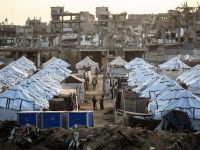Muslim states agreed at the end of a meeting in Qatar Saturday to sever political contacts with Israel "so long as the aggression and blockade against the Palestinian people and its national Authority continues."
The 56-member Organization of the Islamic Conference (OIC) issued a 22-point statement that called for a halt in normalizing ties with Israel, and for the closure of its missions and offices in member states, said reports.
Foreign ministers of the 22-member Arab League called at a meeting in Cairo last week for a freeze on relations with Israel but stopped short of demanding a full break in ties.
Palestinian President Yasser Arafat had appealed to the OIC gathering for strong support for the Palestinian Intifada (uprising) to end Israel's occupation of the West Bank and Gaza Strip that dates to the 1967 Middle East war.
In response, the OIC, representing 1.2 billion Muslims around the world, agreed on urgent financial aid without specifying any figures.
'END ALL FORMS OF NORMALISATION'
"(We) call on member states which have established, and which had started to take steps to establish, relations with Israel within the context of the peace process to break these relations and to close down any missions or offices," it said, cited by the Qatari Gulf Times newspaper.
"(They should) sever all economic relations, and end all forms of normalization with Israel until it meticulously and sincerely implements the UN resolutions on Palestine, Holy Jerusalem and the Arab-Israeli conflict, and until the restoration of a just, comprehensive peace in the region.
"(We reaffirm our) adherence to a just, comprehensive peace option in the Middle East...on the basis of implementation of (UN) resolutions 242, 338 and 425 -- the land-for-peace principle, and return of Palestinian refugees to their homes."
Some OIC states, including Turkey, which has close military ties with Israel, and several African members with diplomatic relations, had voiced reservation about breaking political contacts with the Jewish state, reported Reuters.
The communiqué urged world powers to press Israel to halt violence against Palestinians and accept various peace initiatives on the table.
It found fault with the United States over its perceived pro-Israeli bias and Israel's use of US-made weapons in eight months of fighting that has killed at least 447 Palestinians, 87 Israelis and 13 Israeli Arabs, and wounded thousands, said Reuters.
"(We) call on the United States to promptly intervene to stop the Israeli aggression and prevent the Israeli government from continuing to use lethal and internationally banned weapons against civilians, which has shaken the very foundations of regional security and stability and put the Middle East region on the brink of a destructive war," the resolution said.
The statement echoed Arafat's earlier condemnation of Israel's use of US-made F-16 fighter jets, ground-attack Apache helicopters and main battle tanks as well as "the use of depleted uranium bullets and poison gas..."
Israel has denied using uranium bullets and poison gas, previous reports said.
According to Reuters, Qatar dismissed calls for cuts in oil supplies to countries backing Israel to force them to meet Muslim and Arab conditions for ending the Middle East conflict.
'OIL WEAPON' RULED OUT
Qatari Foreign Minister Sheikh Hamad bin Jassem bin Jaber Al Thani told a news conference an oil boycott like that imposed during the 1973 Arab-Israeli war was not an option now, said the Gulf Times.
But the OIC resolution called for an international criminal tribunal to try Israeli officials "as war criminals" responsible for "heinous massacres" and human rights violations.
It asked the United Nations to make Israel pay "reparations for moral and material losses" suffered by Palestinians, said the paper.
The OIC said it would once again lobby world powers for a UN Security Council session that would authorize a special protection force for Palestinians. An earlier move to do so was scuttled by the United States, the Council's weightiest member.
It urged Washington "in particular not to obstruct a Security Council process to reach such a decision".
Palestinian delegates said the OIC statement was the best that could have been extracted from a gathering of Muslim states from around the world. They said the statement's impact would depend on how widely it was implemented – Albawaba.com
© 2001 Al Bawaba (www.albawaba.com)







